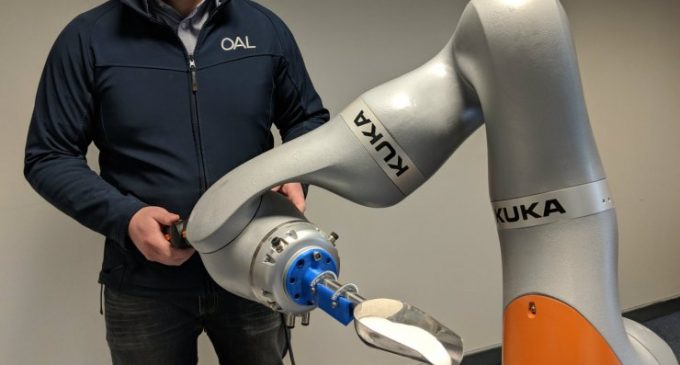Major Productivity Gains in Ingredient Handling With Robots

Did you know as much as 5% of a food manufacturer’s turnover is associated with the costs of raw material handling, weighing and preparation? That number is set to drop as engineers, food technologists and computer scientists, drawn from UK industry and academia, collaborate to fully automate the preparation and handling of raw materials.
OAL (Olympus Automation Ltd), a supplier of engineering solutions to the food industry, is leading the major new industrial R&D project in collaboration with researchers from the University of Lincoln, UK, and English Provender Company, an award-winning producer of condiments, dressings and marinades. Food and drink is the UK’s largest manufacturing sector, worth £110bn in GVA annually
The collaboration is part-funded by a UK Government grant of almost £900,000 from Innovate UK through its Materials & Manufacturing research fund funding stream.
The project is aiming to address the unique complexity of food manufacturing ingredient variability. In a given day, food manufacturers can deal with over 200 different raw materials with different states (solid, liquid, frozen, ambient and chilled), packaging format (bag, sack, box and drum), allergens and handling difficulties. It’s this complexity that to date has led to high manning levels, waste and inefficiencies in the industry.
Deploying OAL’s suite of APRIL Robotics Material Handling modules as their toolset at the University of Lincoln’s National Centre for Food Manufacturing Centre, the research team is exploring how to integrate robotic and automation solutions at each step of the production process. The research will examine how processes such as product handling and weighing, can be streamlined and made more efficient through new robotic technologies.
Andy Riches, Group Operations Projects Director at the Billington Group explains more about the handling challenges: “The ability to accurately and efficiently prepare, weigh and batch the complex combination of ingredients within our product portfolio really is the engine room of our production environments. The processes involved have a direct effect on food safety, product quality and factory efficiency. We believe that the use of increased automation and technology to provide enhanced control, accuracy and repeatability will have a massive positive effect on all three of these critical factors within this core business function.”
One of the APRIL Robotics technologies that will be used in the project is a micro-ingredient weighing station that uses a collaborative robot to weigh out free flowing and non-free flowing powdered ingredients to an accuracy of 1g. This technology was developed under a separate Innovate UK project between OAL and the University of Lincoln.
Jake Norman, Head of Innovation at OAL explains: “Weighing out powders is a common task across the industry that presents accuracy and health and safety challenges when undertaken by people. By using a collaborative robot and smart algorithms from the University of Lincoln, we can quickly weigh out powders, to a recipe, to an accuracy of 1g with zero cross contamination. In this project, we’re working with EPC to map out their processes and crunch a year’s production data to analyse what the best solution is, looking at the potential for optimisation at each step.”
Mark Swainson, Deputy Head at the University of Lincoln’s National Centre for Food Manufacturing (NCFM) is an expert in the field of industrial food processing technology. He will lead the research team, which also includes specialists in robotics, automation and process control from the University of Lincoln’s School of Engineering.
He says: “To unlock improved value, quality and sustainability, the food manufacturing sector needs a game-changing, innovative reinvention of its production processes. We want to push the practical and scientific boundaries of food process technologies, robotic materials’ handling, machine learning, and computer vision systems. The goal is to produce a full technological solution which provides proof that robotics and automation can be the catalyst for much-needed productivity gains in the food manufacturing industry.
“The industry needs a step change. All the low hanging fruit has gone. This project is not about marginal gains, it is about identifying a game-changer that can turbocharge productivity in food manufacturing processes.”
If you would like to learn more about ingredient handling and preparation automation, you can join OAL and the University of Lincoln for their Food Manufacturing 2030 event. The event will combine expert guest speakers with breath-taking demonstrations, so you can learn how robotics is changing the way we handle and process raw materials. Learn more and sign-up here: https://www.oalgroup.com/events/raw-material-handling-with-robots-food-manufacturing-2030

































